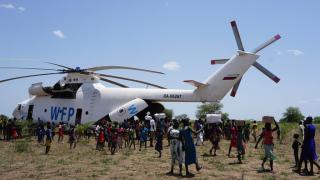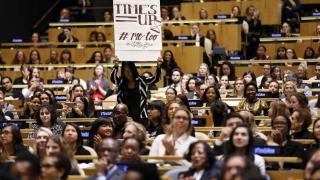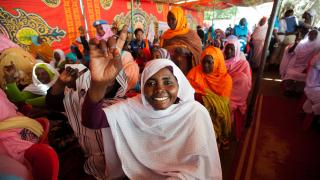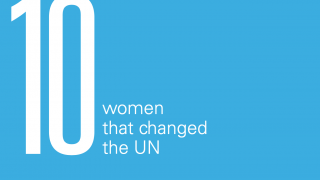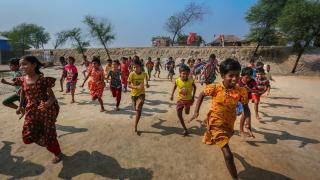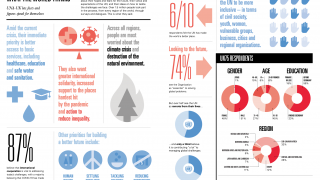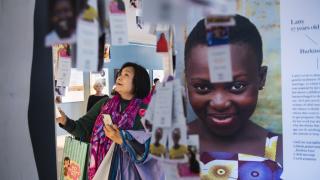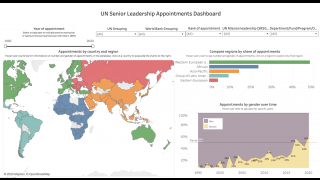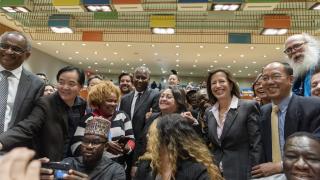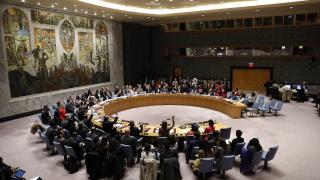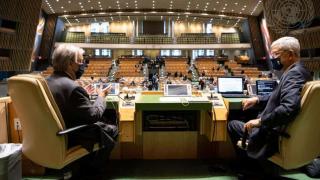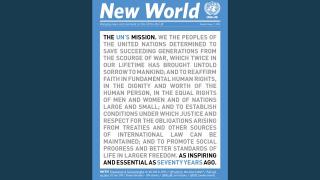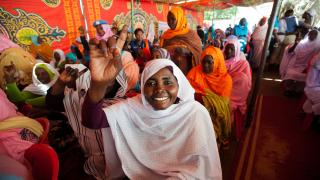
In 2020, we experienced a year like no other with a pandemic that has already claimed more than a million lives. The associated economic calamity is projected to make the world economy 4.4 per cent smaller this year and cost an estimated US $28 trillion in lost output through 2025. The pandemic and huge economic disruptions add up to untold human desperation and rising poverty for the first time in decades.
Yet history shows us that in moments of such shared and extreme hardship, the world can come together in a spirit of solidarity to lay the foundations for a better future. Seventy-five years ago, the United Nations was founded in an historic moment for international dialogue and cooperation among nations.
A year earlier, the World Bank and IMF were founded to establish a system for economic development and financial relations among nations. At Bretton Woods, delegates faced two massive tasks: to deal with the immediate devastation caused by the Second World War; and to lay the foundation for a more peaceful, cooperative and prosperous postwar world.
Today, the challenge facing the world is not dissimilar. Once again, we face two massive tasks: to fight the crisis today and build a better tomorrow.
Right now, we know a durable economic recovery is only possible if we beat the pandemic. Stepping up vital health measures is critical, especially in countries that are seeing new waves of the virus. Equally important is stronger international cooperation on the development, production and distribution of effective vaccines and treatments.
While the pandemic continues, support for households, workers and businesses should continue.
So far, G20 governments have provided around US $12 trillion in fiscal support to households and firms. And unprecedented monetary policy actions have maintained the flow of credit, helping millions of firms stay in business. The very strong policy response put a floor under the global economy and prevented the destructive macro-financial feedbacks we saw in previous crises.
This support should not be withdrawn prematurely. Doing so could derail the recovery since almost all countries are still hurting, especially emerging markets and low-income economies. And we face what I have called a “long ascent” for the global economy: a climb that will be difficult, uneven, uncertain – and prone to setbacks.
Along the way, we must also address some persistent problems that predate the crisis – low productivity, slow growth, high inequalities and the threat of climate change. We can do better than build back the pre-pandemic world – we can build forward to a world that is more resilient, sustainable and inclusive.
To do this, we must embrace three priorities.
FIRST, ALL COUNTRIES SHOULD FOCUS ON THE RIGHT ECONOMIC POLICIES
Prudent macroeconomic policies and robust institutions are critical for growth, jobs and improved living standards. Together with reforms to boost trade, competitiveness and productivity, strong policy frameworks can help create confidence for action now while building much-needed resilience for the future.
That includes keeping a careful watch on risks presented by elevated public debt. We expect debt levels to go up significantly in 2021, with global public debt close to 100 per cent of GDP in 2021.
The Fund is providing debt relief to its poorest members and, with the World Bank, we support the extension of the Debt Service Suspension Initiative that has already led to an estimated $5 billion of 2020 debt service being deferred. Beyond this, where debt is unsustainable, it should be restructured without delay with private sector participation, and we should move towards greater debt transparency and enhanced creditor coordination. The G20’s recent action to facilitate efforts to address unsustainable debts is welcome.
SECOND, TO REAP THE FULL BENEFITS OF SOUND ECONOMIC FOUNDATIONS, COUNTRIES SHOULD FOCUS ON POLICIES FOR PEOPLE
That means investing in health and social protection to underpin growth and resilience, together with policies to accelerate gender equality. It also means investing in education and training to reduce inequality, harness the potential of young people, improve productivity, and tap into new opportunities that come with the rapid advances in technology.
Access to the internet is critical because it connects people to the digital economy, which is essential for growth and development in the future. Expanding internet access in Sub-Saharan Africa by 10 per cent of the population could increase real per capita GDP growth by as much as 4 percentage points.
FINALLY, TO BUILD FORWARD TO A BETTER FUTURE, ALL COUNTRIES MUST TAKE URGENT ACTION TO ADDRESS CLIMATE CHANGE
The IMF is focused on climate change because it is macro-critical, posing profound threats to growth and prosperity. It is also people-critical and planet-critical. In the last decade, direct damage from climate-related disasters adds up to around US $1.3 trillion, to say nothing of the indirect effects and human impact.
Our research shows that, with the right mix of green investment and higher carbon prices, we can steer toward zero emissions by 2050 and help create millions of new jobs.
We have an historic opportunity to build a greener world, and also a more prosperous and job-rich one. With low interest rates, the right spending decisions today can yield a quadruple dividend tomorrow: avert future losses, spur economic gains, save lives, and deliver social and environmental benefits for everyone.
At the IMF, we are working tirelessly to support a durable recovery and a resilient and inclusive future as countries adapt to structural transformations brought on by climate change, digital acceleration and the rise of the knowledge economy.
From our position at the centre of the global financial safety net, we have acted swiftly in this crisis like-no-other to provide policy advice, capacity development and financial resources. Since the pandemic began, we have made commitments totaling over US $101 billion to 82 countries, including 49 low-income countries, and we stand ready to do more.
We will continue to give our full support to our members and pay special attention to the urgent needs of emerging markets and developing economies – especially small and fragile states. And we are ready to help countries build forward to a better post-pandemic world.
Photo: International Women’s Day in El Fasher, North Darfur, on 11 March 2013. Investing in health and social protection to underpin growth and resilience, together with policies to accelerate gender equality is a vital part of economic recovery after catastrophe. © UNAMID/Albert González Farran


